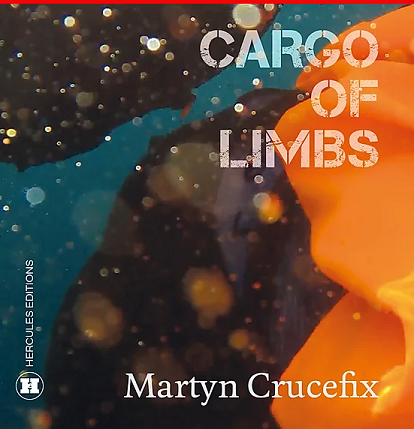Review of Cargo of Limbs by Martyn Crucefix with photographs by Amel Alzakout, pub Hercules Editions

crossing the liminal
places of the homeless
Those who accuse poetry of failing to engage with current concerns do not really understand the process whereby events and concerns are transmuted into poetry. Disparate things come together and meld into something new, stirred round in what mediaeval Welsh bards called Ceridwen’s cauldron. This osmosis takes time, but the material of what might be called the mass migration question, the steady westward stream of refugees and poor folk trying to better themselves, is just about ready now and is surfacing in many a collection.
Crucefix’s long poem came about in just this way: two quite separate experiences playing off each other. In 2016, the poet listens to a reading of Seamus Heaney’s translation of Book 6 of The Aeneid, but finds the pictures in his head are not of the banks of Acheron but the shores of the Mediterranean, with the bodies washed up thereon, in particular that of three-year-old Alan Kurdi (the name at the time was widely reported as Ayan or Aylan but is indeed Alan).
So a world-famous photograph and a reading, a mythical river and a real sea, a classical poet and his twentieth-century translator, a morally quite dubious hero and the most innocent of small boys all blend in the cauldron. The result is a rethinking of the moment in the Aeneid where our hero, accompanied by his priestess guide, arrives at the bank where dead souls congregate in hopes of being ferried over but are only allowed into Charon’s boat if they have had their funeral rites. The others, the “resourceless” as Virgil calls them, are stranded between worlds and Aeneas, not always the most compassionate man, pities their plight.
In this version the priestess, appropriately for a book of both poems and photographs, becomes a “lensman”, and Aeneas is Andras, a credible Middle European-ish name - and here I must dissent from Choman Hardi’s introduction, which identifies him with a demon of that name. There does indeed seem to be an Andras in the demonology, who commands thirty legions of demons, but this is surely pure coincidence, of which the poet may well not even have been aware. Andras here is just a name that happens to sound vaguely like Aeneas, and this Andras’s outburst at the end of the poem is purely human:
Suppose I know –
even from what lives
these wretches come –
from what wretched plight
out of what violence
to want this – pay for this –
say by what rule
by what moral right
does any man here let
some pass and some pushed
back into the night
no less fraught than
the cold and lethal waters
these others scrum
to risk their lives upon…
It is essentially the same question Aeneas asks – “how is it decided who are to retreat from the bank and who are to be conveyed?” But the tone of perplexed curiosity in his voice has here been replaced by frustration and anger. And the identity of the “sullen boatman” is more fluid. When he
elects one but not another
leaves the remainder
he shoves them aside
rescues as he condemns
then clearly on one level this modern Charon is a people-smuggler, risking these unfortunates’ lives for the money they pay him. But the phrase “any man here” invites us to consider others who make choices – immigration officials, politicians, those who elect them – and the degree of their/our responsibility.
The photographs, so appropriate in a poem partly inspired by a famous photograph, were taken by Amel Alzakout in unusual circumstances. She herself, in 2015, travelled from Izmir in Turkey to Lesbos in a smuggler’s small boat. She was determined to film the journey but had to do so secretly, with a camera concealed in her sleeve, as smugglers are unsurprisingly shy of being filmed. Halfway across, the boat collapsed but she filmed on until rescue came.
The result is photographs that capture the surreptitiousness and haste of the enterprise, fleeting moments filmed from odd angles, over people’s shoulders, so that one feels part of the scene in which she found herself. Forty-two people on that boat died in the water; had she been among them, we should have lost not only a talented artist but a most unusual and striking record, which echoes and complements the moving, restrained cadences of the poem.
It’s an odd title for a press, this Hercules Editions. Hercules was a hulking dimwit with no style or delicacy: the books I have seen from this press are tiny, beautifully crafted jewels. At the end of this one, Andras is sufficiently moved by what he sees to stop his cameraman filming. His reaction is understandable but misguided;, for just as Amel Alzakout’s shots give us a unique insight into her journey, so the words in which Crucefix commemorates the “great cargo of limbs” crossing the ocean humanises them and brings them closer to us.
Published on April 21, 2020 03:49
date newest »
newest »
 newest »
newest »
message 1:
by
Harry
(new)
Apr 24, 2020 05:03AM
 A thoughtful, intelligent and compassionate review of a collection that itself appears to be those things. I would now like to read it, both for the poetry and the photographs. Thank you.
A thoughtful, intelligent and compassionate review of a collection that itself appears to be those things. I would now like to read it, both for the poetry and the photographs. Thank you.
reply
|
flag



